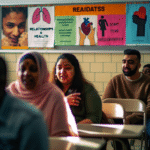Navigating personal relationships with awareness and informed decision-making is crucial in today’s world. This article delves into various aspects of sexual health education, respectful relationships, and safety in intimacy. It highlights important tools for fostering trust, understanding boundaries, and promoting emotional wellness.
The Importance of Sexual Health Education
Sexual health education plays a critical role in establishing a foundation for informed decision-making, essential for developing safe and respectful relationships. Comprehensive programs empower individuals with vital contraceptive knowledge, body awareness, and personal health care insights. These elements foster health-conscious intimacy, enabling people to practice safety in closeness while respecting their own and others’ boundaries. By promoting open communication and trust, sexual health education enhances emotional wellness and equips individuals with the necessary tools to navigate relationships, ultimately leading to healthier lifestyle choices and improved personal health safety.
Building Respectful Relationships
Building respectful relationships is essential for fostering emotional wellness and safety. Trust and communication serve as the bedrock of these connections. Respectful relationship programs educate individuals on recognizing healthy dynamics, emphasizing mutual consent and support. They can effectively prevent violence by instilling a culture of understanding and empathy. Key components include promoting health-based intimacy education, tools for healthy communication, and emotional care resources. These programs empower participants to make informed decisions, nurturing an environment where personal health and safety thrive within relational contexts.
Understanding and Establishing Boundaries
Understanding boundaries within relationships is essential for personal and emotional safety. This awareness fosters mutual respect and lays the foundation for healthy interactions. Strategies for effectively communicating boundaries include active listening, using “I” statements, and checking for understanding. Respecting each other’s boundaries involves regular discussions and re-evaluations, focusing on personal comfort levels. This practice not only enhances trust and communication but also empowers individuals to advocate for their needs, fostering environments where everyone feels safe and valued in their relationships.
Health-Based Intimacy and Safe Closeness
Health-based intimacy education is vital for cultivating safety in closeness within relationships. It equips individuals with knowledge about personal health care and contraceptive options, enhancing body awareness. Understanding health-conscious intimacy involves utilizing tools such as informed consent, open communication, and the establishment of personal boundaries to foster trust. Intimacy coordinators in media play a crucial role by modeling respectful relationships and safe touch awareness, thus serving as educational resources that promote thoughtful connections and emotional wellness. These coordinators help demystify intimacy, allowing for healthier expressions of closeness.
Emotional Care and Wellness Resources
Emotional care resources are integral to fostering a wellness lifestyle, particularly in relationships. They provide essential support for emotional health, enabling partners to navigate challenges. Effective tools include active listening techniques, conflict resolution skills, and aftercare practices that reinforce trust post-intimacy. Moreover, education on emotional expression and vulnerability enhances connection. Establishing a safe space for open dialogue promotes transparency, crucial for informed decision-making. By prioritizing emotional wellness, individuals can cultivate a nurturing environment that encourages mutual respect and understanding, solidifying healthy, respectful connections.
Food for Thought
Comprehensive sexual health education and awareness in relationships contribute significantly to personal and communal well-being. By emphasizing respectful connection and informed choices, we can build healthier societies where intimacy and trust flourish.






Leave a Reply